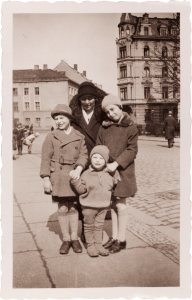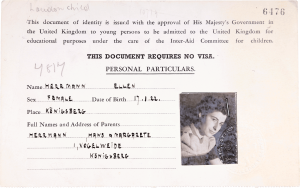
Ellen Rawson
Ellen remembers a happy childhood living in what was then East Prussia. Witnessing the November Pogrom (Kristallnacht) in 1938 marked a turning point in her life. Soon after, she escaped to England on the Kindertransport, where she initially moved around, living with several different families, and had to provide domestic help.
Image: Ellen Rawson © The National Holocaust Centre and Museum
Eventually, the Committee lady came and collected me. She had lost her domestic help at home, so I was left to cook, clean and do everything in the house. It was horrible. I just sat on the stairs and cried.
A happy family life

Ellen with her brothers and mother © NHCM
Ellen Rawson (née Herrmann) was born on 17 January 1922 in Königsberg in East Prussia, then Germany. Ellen’s brother, Gert, was born less than a year after her, so they were brought up practically as twins. Seven years later, their brother, Heinz, was born.
Ellen’s family led a comfortable life. Her mother, Margarethe, was very friendly and would often go out of her way to help people. Her father, Hans, was loving but was away a lot for work. He worked in the family business supplying materials to tailor shops in Europe. During the First World War he fought for Germany and received the Iron Cross.
My parents never quarrelled, and they made my childhood a haven. I was taught by their example at an early age to respect and be helpful to other people.
Ellen had a large extended family, and had many fond memories of attending family gatherings, such as her brother’s bar mitzvah. Whilst they were not Orthodox Jews, religion played an important role in Ellen’s family and they would go to synagogue together every Friday night.
Ellen had many friends growing up, both Jewish and Catholic. Her best friend was a Catholic girl whom she saw every day. However, by the 1930s they had to keep their friendship secret as her brother was in the SS.
The November Pogrom (Kristallnacht)
Once Hitler came to power life became gradually more difficult for Ellen and her family. Ellen recalled:
Our class was asked to give a radio performance and every girl was given a part to read, including me. I studied it, but then I was suddenly told “No! you can’t take part in it, you’re Jewish.” That really hurt at the time.
In 1938, Ellen travelled to Mannheim, Germany, to learn how to sew. It was here that she witnessed the November Pogrom (Kristallnacht). She remembered seeing crowds of people in the street, destroying Jewish properties wherever they saw them. Ellen’s mother had predicted that something like this might happen and had told her ‘If anything happens, take some money and take the tram to Heidelberg to my cousin’. Ellen had to stay in her cousin’s flat in Heidelberg for two or three weeks, because it wasn’t safe for Jews to go out.
Fleeing on the Kindertransport

Entrance papers that allowed Ellen to enter England © NHCM
Ellen’s mother decided that Germany was not safe for Ellen and wrote to several organisations abroad, trying to find a safe place for her children to go. The only positive reply she received was from the Ladies’ Committee of the synagogue at Seymour Place, London. Ellen left on the Kindertransport in June 1939, age 17 (the maximum age for passengers on the Kindertransport scheme).
The whole family came to see me off at the station in Königsberg and my father travelled with me to Berlin to join the Kindertransport train… I was a bit tearful, but I didn’t take it all that seriously. I thought I would see them all again.
There was a reported case of scarlet fever on Ellen’s train, which led to Ellen and a few other children not being picked up from the train station. They were instead taken to Islington Hospital, where they stayed for just over a week. Eventually a member of the Ladies’ Committee came to collect Ellen, and immediately put her to work doing household chores. She was unhappy during this time, as she missed her family terribly, couldn’t speak English, and was told to do unpaid work instead of continuing her education. Ellen then moved around from family to family having to do domestic work, only staying for around two weeks at a time.
Once war broke out she was evacuated. She managed to find a job as a machinist at a Jewish firm, which was her first proper job. One of Ellen’s brothers, Gert, also made it to England, and worked on farms.
Unfortunately, Gert was the only member of Ellen’s family that she ever saw again. Communication with her parents was restricted to very infrequent Red Cross letters. She later found out that they were transported to Riga, Latvia, on the very last transport from Königsberg and shot on arrival. Her youngest brother Heinz died shortly after the war ended, before Ellen could establish any contact.
Ellen eventually married and settled in Nottingham. Later in life she became a close friend and supporter of the National Holocaust Centre and Museum and gave her testimony as long as she was able.
Ellen Rawson’s experience during the Holocaust is featured on the Ordinary Objects, Extraordinary Journeys website we created in partnership with the National Holocaust Centre and Museum. Visit the website to learn more about Ellens life, journey and objects of significance to her.
This life story was written with the support of the National Holocaust Centre and Museum.


